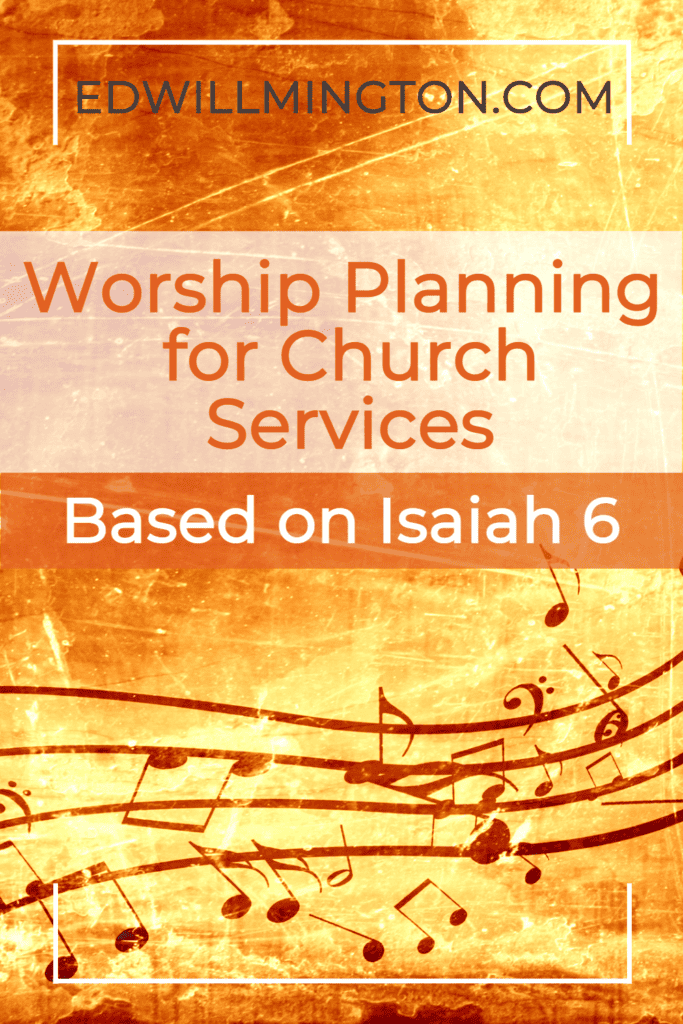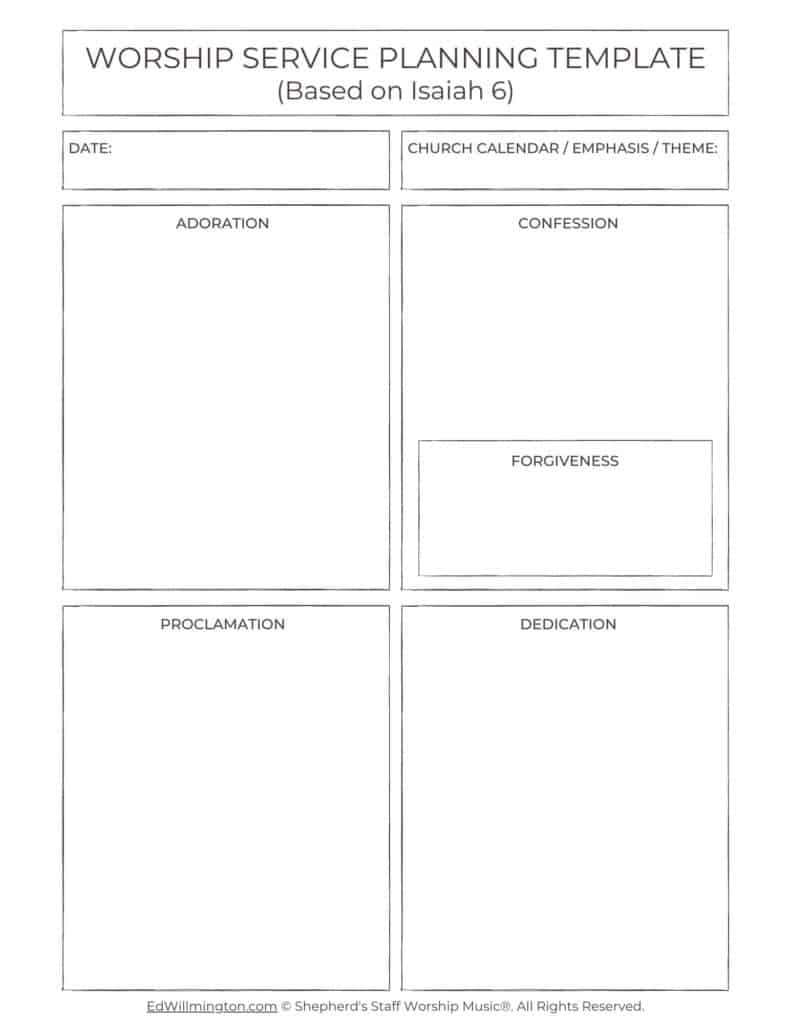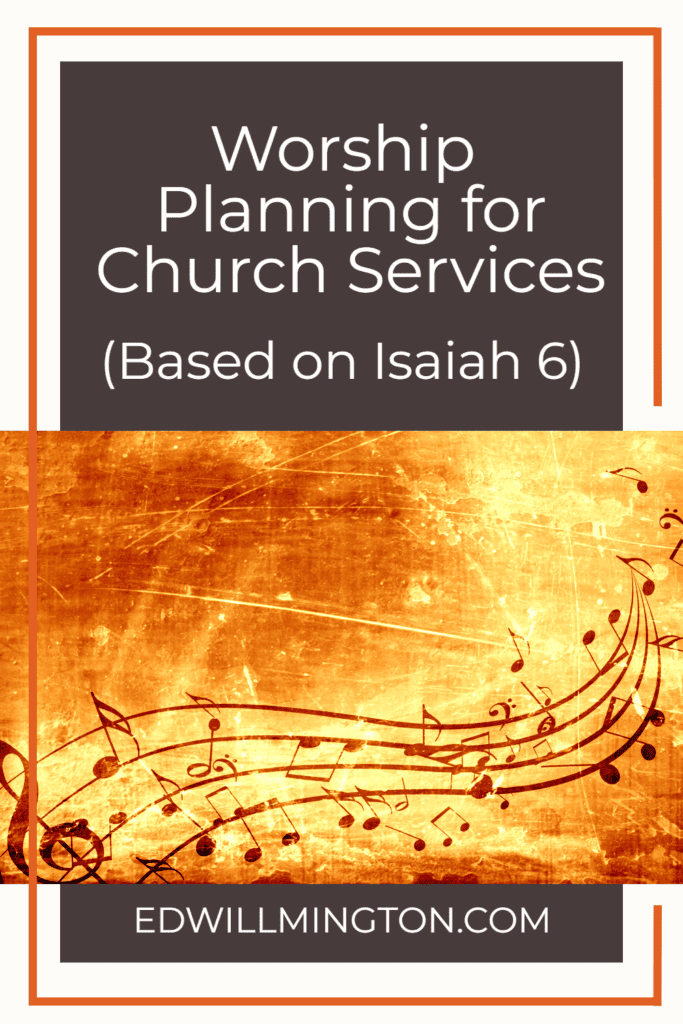
For those who do not have a prescribed liturgical structure, it can be hard to know where to start when planning a worship service.
How do you create an engaging and meaningful worship service that speaks to your congregation? There’s nothing worse than staring at a blank page.
We’ve created a blog post about worship planning based on Isaiah 6. This ancient passage is full of beautiful imagery and offers guidance for creating powerful and comprehensive worship services.
This post originated from conversations between Ed and his elder daughter, Nicolette, who is a “retired” accountant and now a homeschool mom. She loves her family and loves to travel.
HI THERE! DON’T FORGET TO PIN THIS FOR LATER!

Worship Planning
Worship is an essential part of the Christian faith, and it’s important to plan worship services that are engaging and meaningful for your congregation. In this blog post, we explore how Isaiah 6 can provide guidance for creating powerful and comprehensive worship services.
We discuss the importance of worship planning, consider challenges and considerations when designing a service, as well as offer tips on creating a successful spiritual environment in churches today.
With these insights from Isaiah 6 in mind, you can craft inspiring church services that leave lasting impressions on your congregation.
Importance of Worship Planning
Having a clear plan for worship services is essential for creating an effective and meaningful experience. Planning helps to ensure that the service flows smoothly, and it also provides purposeful direction for your congregation.
In Isaiah 6:1-8, we see how God instructs Isaiah to go out and spread his message. In the same way, we must be intentional in our planning of worship services. We must be sure to have clear goals and expectations, as well as consider the needs and interests of our congregation.
Worship Planning Based on Isaiah 6
Let’s jump right into the text and context of Isaiah 6. We are presented with a vision of the Lord sitting on his throne, attended by seraphim. The scene is both awe-inspiring and powerful.
Adoration
The heavenly beings are recorded as saying: “Holy, holy, holy is the LORD Almighty; the whole earth is full of His glory.” This amazing sound caused the temple to shake, and the original smoke machine was set off. (Remember Mount Sinai and how terrifyingly powerful God’s voice was to the Israelites, as well as the mountain being covered with smoke?)
This awe-inspiring moment serves as a reminder of how powerful God is, and how we should approach Him with reverence and adoration.
What would be your response, if you were in Isaiah’s sandals? Would you be laughing? Prostrate on the ground? Consider this when you’re planning how to encourage your congregation to adore the Almighty God of heaven and earth.
Adoration is an important element of any church service and helps to foster a deep connection between the congregation and God.
The most important part of this first part of Isaiah 6 is realizing that God is holy, which means that we are not. We are unholy. Adoration provides an opportunity to look at God’s holiness and our own unholiness.
This naturally leads to confession.
Confession
When we realize the depth of God’s holiness and of our unholiness–really the depth of our sin–we can then respond with confession. This is an important part of any church service, as it allows us to confess our sins and seek God’s forgiveness.
In Isaiah 6:5, after what he has just witnessed, Isaiah cries out, “Woe to me! I am ruined! For I am a man of unclean lips, and I live among a people of unclean lips, and my eyes have seen the King, the LORD Almighty.”
Do you remember what happens next? It makes me cringe to think about it. The live coal part. One of the seraphs takes a live coal from the altar, touches it to Isaiah’s mouth, and says (in verse 7), “See, this has touched your lips; your guilt is taken away and your sin atoned for.”
Forgiveness granted! Isaiah the prophet was moved to confess his sins and seek God’s forgiveness. And, because of God’s grace, He does forgive Isaiah, even though he was a man of unclean lips.
Don’t miss that! God is faithful to forgive our sins! So, confess them, and rejoice!
In your services, it is important to guide your congregation through the process of confession and repentance. But, how often do you include a time of confession in your service order, culminating in a moment of rejoicing for the forgiveness received?
You can incorporate music, visuals, and teaching (including Scripture readings) to help the congregation understand their need for forgiveness from God and his willingness to grant it.
As a result of Isaiah’s confession, he is called by God to go forth and spread His message.
Proclamation
Once we have expressed our adoration to God, confessed our sins and received His forgiveness, then we are open to hear the Word of God effectively. This creates a continual dialogue between God and mankind.
The first part of Isaiah 6:8 is the Lord saying, “Whom shall I send? And who will go for us?”
After Adoration and Confession, the passage looks back to God, who is speaking and asking for someone to go forth and spread His message. This shows us that it is God who initiates the mission of proclamation, not just individuals.
When planning for your worship services, make sure to include some form of proclamation or evangelism. It doesn’t necessarily have to be the main focus of your service, but it should still be present.
Dedication
In continuing the dialogue, the natural outcome of hearing God’s proclamation, His question, is our response. So it is here in Isaiah 6:8, as Isaiah responds to the Lord’s questions with, “Here am I. Send me!”
As part of the service, it is important to provide an opportunity for a call to action. This could be anything from getting involved in the church, to sharing their faith with others. Consider how your service can provide an opportunity for people to respond and be obedient to God’s call!
Challenges & Considerations When Designing a Service
Planning for and leading a worship service is no small task, and there are many considerations to keep in mind.
Here are a few that you should think about when designing your services:
- Do you feel pressure to always choose an opening song that is upbeat and joyful?
- Think about and schedule people that will help lead the worship service well (including musicians, sound techs, etc.).
- Do you find that your worship planning process is in a rut? Have you lost your sense of creativity (or do you need to find it in the first place…)?
- Look at your service orders for the last 4 weeks. Did you start the same way every week? Was Scripture reading included? Prayer? Were your action items effective? (Okay, that was a bunch of things in one bullet point!)
Tips for Creating a Successful Spiritual Environment
When planning and leading worship services, here are some tips that can help make it an impactful experience:
- Start with Prayer – Pray before you make any decisions, and ask God to lead you in the right direction. Prayer is a fundamental spiritual practice, and it is critical to your role in developing church service plans.
- Set Goals – Decide what goals you want to achieve through your services, and use that as a basis when you plan. (If you don’t already, aim for a longer-term approach to planning, as opposed to week-to-week.)
- Engage Your Audience – Make sure to keep your audience engaged throughout the service. Plan activities and use visuals or music that will help people stay focused.
- Evaluate – After each service, reflect on what went well and what could be improved for next time. This will help you improve upon your services as you go.
- Continue with Prayer – Having a posture of prayer is something we can all focus on more and more. Make sure to create an environment of prayer throughout your services, and ask God for direction in everything you plan and do.
Worship Planning Template (Based on Isaiah 6)
Once we realize what worship truly is (another post for another time & Hint: it’s not just about songs and music), we need to plan services prayerfully and thoughtfully.
We’ve created a FREE Worship Service Planning Template for you to use when planning your services!
This worship service planning template is based on Isaiah 6 and includes sections for Adoration, Confession, Proclamation, Dedication, and more. This planning tool isn’t limited to one type of music or liturgical style.
We hope it helps you create meaningful services that will help your congregation grow in their faith and deepen their relationship with God.

Grab Your FREE Worship Service Planning Template!
Adoration, confession, proclamation, and dedication…all on a one-page template to help you plan your weekly worship services!
Worship Planning Resources
There are so many digital worship resources these days meant to help you organize your worship service planning process. Digital resources, such as Planning Center (part of Church Center church management software), can be a valuable tool for worship leaders and team members.
In this article, we’re talking about the how–specifically, the spiritual aspects of the worship planning process. But, we do acknowledge the benefits of these worship planning software options, so we’ll briefly explore some of the benefits here.
- A service request can be sent to the worship team for certain worship services.
- Schedule volunteers based on their self-indicated block-out dates.
- Worship plans are visible in real time to the entire team.
- Chord charts can be attached, as well as audio files.
- Team leaders can upload files and import songs in the correct key.
- Different teams can learn new songs, with full length recordings and the ability to view song details.
- Having instant access in a central location to each order of service (especially on a mobile app) is quite handy.
- It is possible to use the software as a virtual sheet music app on your music stand.
- Performance histories are available, so you can see past service details, and use that information to balance out future Sunday services.
As helpful as the digital resources are, however, it always comes back to a Spirit-led plan for each one of your church services.
EMW Summary: Worship Planning
Yes, I realize that utilizing Isaiah 6 in your worship planning will probably take a little longer than merely choosing songs that go with a given Sunday’s sermon passage, or topic, or sermon themes.
I invite you, however, to be willing to take the extra time. Think about your congregation–whether they number 10 or 10,000. Consider how you can purposefully lead them through Adoration, Confession, Proclamation, and Dedication. Think about how this process can deepen their understanding and their love for their God.
Go through the steps yourself throughout your planning process, and see how the Holy Spirit speaks to you. Then, as you lead your congregation through these steps to praise and worship the Lord on Sunday mornings, you will be doing so with a greater understanding of the importance and impact that each step holds.
ENJOYED THIS POST? PIN IT FOR LATER!


